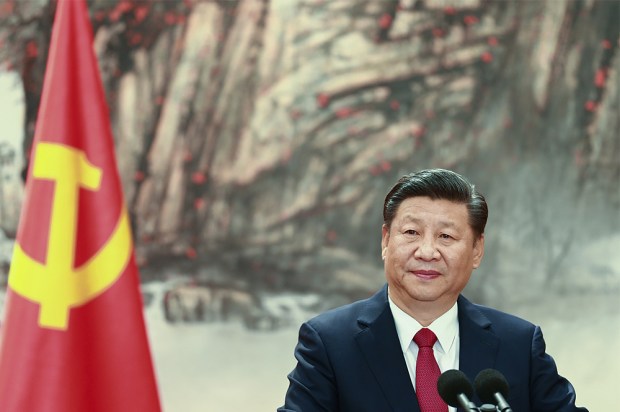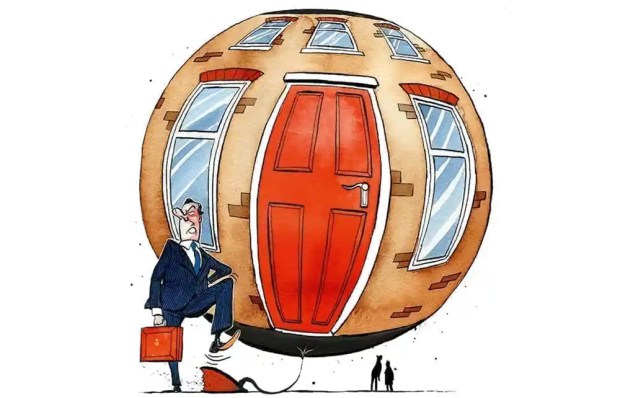At a charity lunch in Manchester, I meet a cheerful ‘engagement manager’ from AO.com, formerly Appliances Online, a fast-growing internet seller of fridges and washing machines headquartered at Horwich near Bolton. The job title is new to me: it turns out to mean engaging the company’s workforce in ways that help them enjoy their jobs and feel valued. Their employment package features a £4-a-month ‘healthcare cash plan’ including dentistry, days off for charity work, gym memberships and a 50 per cent subsidy for ‘any social activity our staff fancy, so long as it develops their skills and is done by more than four people’. The emphasis on well-being and fun is part of the philosophy of chief executive and major shareholder John Roberts, who founded the business in 2000 after a bloke in a pub (who became a co-founder) bet him £1 he wouldn’t do it. At one staff Christmas party, reports Retail Week, Roberts ‘took to the stage with white jumpsuit-clad DJ Lionel Vinyl and led 1,000 employees in a dance to Seventies hit “Car Wash”.’
The colourful AO.com story certainly engaged me, not least because a decade ago I reported on a Prince’s Trust skills project in Bolton for troubled youngsters and saw how desolate Lancashire’s old mill towns were becoming — except for a shiny business and retail park at Horwich, beside Bolton Wanderers’ Reebok Stadium. This new development was sucking the economic life out of the centre of Bolton — just as customer-friendly, fast-delivery online retailers like AO, which operates from that very park, are now sucking the life out of traditional white-goods chain stores.
But if commercial evolution leads to rewarding jobs in businesses with enlightened, fun-loving bosses and promising futures, then I’m all for it, and I’m pleased to hear AO is heading for the stock market this year at a valuation of £1 billion-plus. John Roberts himself is in for a £400 million windfall — and as a reward for progressive, upbeat entrepreneurship, who can say he doesn’t deserve it?
Outwitting the Eurocrats
I have long argued — leaving morality and envy aside — that bankers’ remuneration needed to be radically scaled back because the prospect of giant bonuses was the direct catalyst for the delusional, high-risk decision-making that brought the financial sector to ruin in the last decade, and human nature is such that the pattern will repeat itself, however fierce the regulatory regime and however often anyone claims lessons have been learned. So you might expect me to welcome the EU regulation imposed last month to limit bank bonuses to 100 per cent of salary, or 200 per cent with shareholders’ agreement. But the trouble with this new regime is precisely that it emanates from Brussels, which means everyone in the City bastion of Euroscepticism, and many of their friends in Westminster, regards the circumventing of it as fair game, and perhaps even as a patriotic duty.
Bank of England Governor Mark Carney gave weight to that impulse when he told the Treasury select committee that the EU approach was ‘absolutely’ wrong — because it perversely encourages bigger short-term cash bonuses when wiser regulators now prefer to see deferred rewards in the form of equity, with the possibility of clawback if personal or corporate performance deteriorates. The result is a fever of City creativity to outwit the Eurocrats, the winner so far being a scheme that disguises advance bonuses as monthly ‘allowances’, counted as additions to fixed salary, and thereby boosts the multiple for the year-end payout. The accountants PwC say an ‘overwhelming majority’ of banks are contemplating using this device.
Meanwhile, Barclays chief executive Antony Jenkins has followed RBS’s Ross McEwan in declaring that he won’t accept any bonus for himself this year. But no one believes the pair are setting an example that will cascade all the way down through the hierarchies below them. Rather, the suspicion is that they are setting up self-denying smokescreens so that their banks take alittle less flak for the massive packages they will go on paying ‘star’ traders and dealmakers — and any other middle managers who happen to have enjoyed a ride on improving markets — for fear of losing them to the likes of Goldman Sachs.
The rest of the nation will continue to think such rewards are grossly undeserved — dragging us back to the sphere of morality and envy, and giving Miliband and Balls more ammunition for their ‘kick the filthy rich’ campaign theme that I wrote about last week. But more importantly, the corrosive risk-incentive problem will remain fundamentally unaddressed, and no one knows where and when the cancer of bad banking will strike next.
Cheap insults
I do hope Ryanair boss Michael O’Leary isn’t going to start being polite to me just because he clocked up a £29 million post-tax loss for the last quarter. In the hope of maintaining the growth that has turned Ryanair into Europe’s biggest airline against copycat low-cost competition on all sides, he has declared a new spirit of goodwill and helpfulness towards passengers who he once said contemptuously ‘would crawl naked over broken glass to get low fares’. Well, that certainly included me. I must have taken about 60 of his flights in the past decade, and I’ve always relished the game of paying him as little as possible by refusing to buy anything on board and never checking in a bag. In return, his planes landed on time about 59 times out of 60, and I love the taped fanfare that crowingly tells you so. The dreadful 60th — we landed at the wrong airport, three hours on a night bus from the right one — brought no hint of apology. But everyone loves telling Ryanair horror stories, and operationally this is one of the world’s most efficient businesses, a great maverick force for affordable travel. So come on, O’Leary: you once said you ‘don’t give a shite’ if nobody likes you. Stop pretending to be friendly and get back to business as usual.
Got something to add? Join the discussion and comment below.
Get 10 issues for just $10
Subscribe to The Spectator Australia today for the next 10 magazine issues, plus full online access, for just $10.
You might disagree with half of it, but you’ll enjoy reading all of it. Try your first month for free, then just $2 a week for the remainder of your first year.














Comments
Don't miss out
Join the conversation with other Spectator Australia readers. Subscribe to leave a comment.
SUBSCRIBEAlready a subscriber? Log in